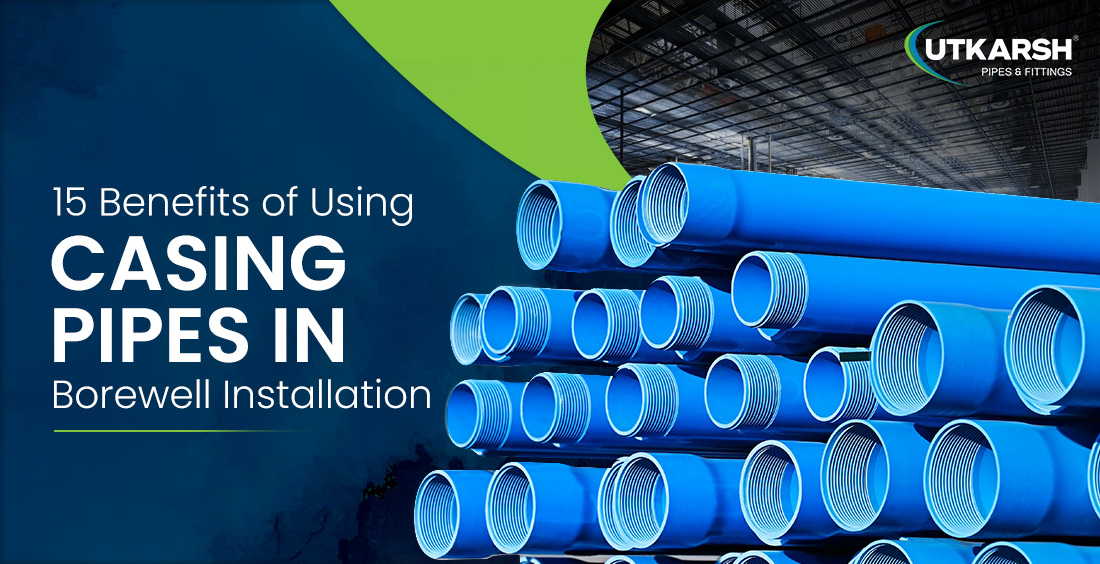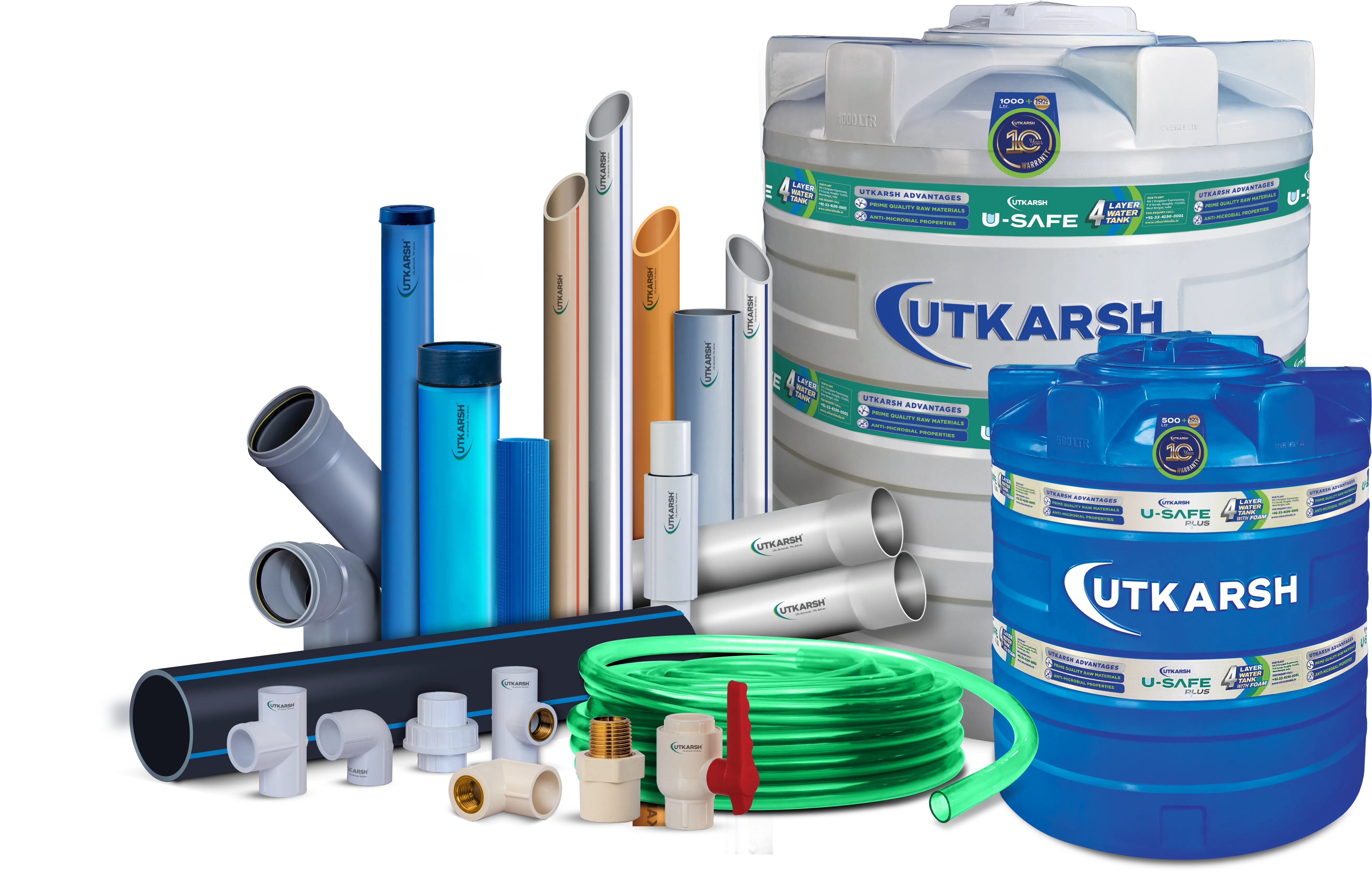15 Benefits of Using Casing Pipes in Borewell Installation

Borewells are important groundwater sources, especially in regions where surface water is insufficient. The selection of correct materials for borewell construction is significant in durability, efficiency, and cost-effectiveness. Among these materials are casing pipes, a solution that shows numerous advantages compared with conventional alternatives. This blog discusses the 15 advantages of using casing pipes in borewell installations, divided into three comprehensive headings.
Durability and Reliability
Resistance to Corrosion:
An exceptional badge of merit for casing pipes, especially PVC casing pipes, turns out to be corrosion resistance. Unlike conventional metals, PVC does not rust or undergo chemical reactions, thus enabling a very long life even under adverse underground conditions involving the acidity of water and soil, which would otherwise hasten deterioration by corrosion.
High Structural Strength:
Casing pipes are designed for very high structural strength so that they can hold up against the enormous pressure surrounding soil layers exert during borewell operation. This is even more critical for very deep borewells, within which the pipes sustain enormous loads and stress.
Dimensional Accuracy:
Manufactured under strict conditions, casing pipes maintain a remarkably accurate dimension for an excellent fit and superb alignment during installation. A misalignment or failure of a pipe is all but eliminated, thus increasing the overall reliability.
UV Resistance:
As borewell casing pipes are usually underground, they should retain and enjoy UV resistance properties because they are often exposed to sunlight during transportation or storage. This prevents their destruction by continuous exposure to the sun.
Efficient and Performance Improved
The Light Weight of Simple Handling:
PVC casing pipes are quite light compared to metals and concrete. Difficulties and inconveniences in terms of transportation, handling, and installation reduce labour and logistics costs in borewell projects to a large extent.
Easy Installation:
Adaptable because of the lightweight nature and standard design of casing pipes making it easy to install. The smooth surface and precise threading ease the joining process, leading to quicker installations and limited downtimes.
Maximised Flow of Water:
Casing pipes maximize water flow with very minimal resistance. The inner surface of such pipes is nonhazardous to the other components of the structure, reducing friction. It thus optimizes groundwater extraction, increasing the efficiency of the borewell.
Compatibility with Advanced Systems:
Modern casing pipes are compatible with advanced pumping systems for seamless integration across different applications—agriculture, industry, and household. This feature allows them to respond to a variety of drawdown conditions.
Friendly to the Environment:
PVC casing pipes can be recycled, and their production process entails very little harm to the environment. The durability of the pipes also ensures that the replacement rate over time is low, making these pipes a sustainable solution for borewell construction.
Maintenance at a Cost:
Owing to their minimal corrosion, wear, and chemical deterioration, casing pipes require hardly any maintenance as compared to traditional components. Undoubtedly, it would result in lowered operational overheads over the lifetime of the borewell, hence making it a good investment.
Versatility and Functional Benefits
Customization Features:
Casing pipes come in many sizes, designs, and specifications, like plain and slotted types. This allows the user to choose from various options so that they get the best type of pipe for their specific application in borewells for maximum performance and cost-effectiveness.
Resilience from Contaminants:
These PVC casing pipes have a surface that is non-porous, by which harmful contaminants such as dirt, sand, or chemicals cannot penetrate them. Therefore, it keeps the water that it extracts safe for use in agriculture, in industries, and for household use.
Adjusts with Depths:
The casing pipes are adjustable according to the required length for your borewell, shallow or deep, strong and adjustable; they can suit any project, small or large, simple or complex.
Long Lasting:
Casing pipes are built to serve long-lasting years without wear and tear or any degradation. This property makes them perform continuously and becomes an advantage for their use for long-term groundwater extraction requirements.
Unbeatable Prices:
No matter the advanced features inherent in casing pipes, they rank among the cheap options in the market. This cost-performance trade-off makes them the first preference for borewell installations, whether in cities or villages.
Conclusion
Casing pipes have transformed the borewell installation by offering benefits unmatched elsewhere, such as durability, efficiency, versatility, corrosion resistance, lightweight materials, and compatibility with advanced systems. They become very valuable solutions at a reasonable cost when extracting groundwater.
Realizing the borewell is for agricultural, industrial, or domestic purposes, an investment in high-quality casing pipes is a decision that ensures long-lived performance and sustainability. With 15 reasons clear, no wonder casing pipes are the first option for borewell professionals and the end user.
Frequently Asked Questions
Which pipe is good for casing?
Borewell casing is made using PVC (polyvinyl chloride) pipes, which makes them durable, less expensive, and highly versatile. Excellent corrosion, chemical, and rust resistance, PVC casing pipes ensure a long life even under very adverse underground conditions. Because of is lightweight, transportation and installation are made much easier, which also saves on cost and time.
In addition to this, PVC casing pipes made under specifications with high structural strength and accurate dimensions are necessary to keep the hollow borewell tube well under the soil pressure. The casing piping is in various kinds, such as plain and slotted, and in various sizes. These consider varying extraction needs from groundwater.
PVC casing pipes are very cost-effective and environmentally friendly, are designed to be recyclable, and require little maintenance. Compared to steel or concrete casing pipes, these innovations make the borewell casing much cheaper. PVC casing pipes are good borewell pipes for deep as well as shallow bores and are effective for household, agricultural, and industrial use.
What is PVC casing pipe?
Casing pipe PVC is a kind of polyvinyl-chloride (PVC) pipe that has been specially manufactured for bore and groundwater extraction systems. These types of pipes protect boreholes from soil and debris and keep a clear water-carrying channel inside.
For most end-users, PVC casing pipes are lightweight, corrosion-free, and very durable, thereby avoiding the use of traditional metal and concrete. There are many types, plain and slotted, to meet different application needs.
The pipe achieves an efficient flow of water through its smooth internal surface, besides having a long-life capability guaranteed by chemical resistance and being UV-proof. Easy to place, carry, and transport, the pipes are renowned for agricultural, industrial, and domestic borewell systems, designing the most economical and eco-friendly methods of groundwater extraction.












